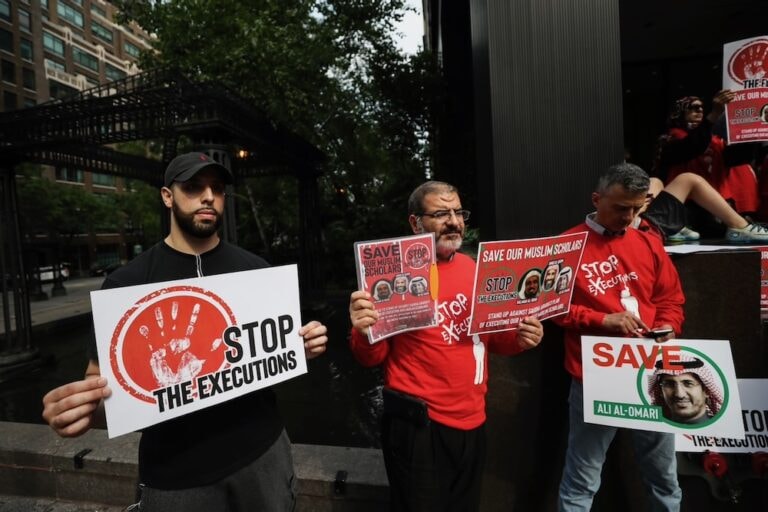Germany is considering a deal to sell tanks to Saudi Arabia despite the latter's dismal human rights record, including severe restrictions on freedom of expression.
(Human Rights Watch/IFEX) – Berlin, July 8, 2011 – Chancellor Angela Merkel of Germany should consider the political signals her government is sending to Saudi Arabia before approving a deal to sell 200 German-made tanks to the kingdom, Human Rights Watch said today. Saudi Arabia has a dismal human rights record and has deployed forces to Bahrain to help suppress pro-democracy protests there.
Saudi Arabia is one of very few countries in the region whose government has offered no human rights reforms in the wake of popular uprisings in neighboring countries since the beginning of the year. Merkel should make a clear and unequivocal public statement expressing concern about Saudi Arabia’s human rights record and its role in neighboring Bahrain, Human Rights Watch said.
“The sight of Saudi tanks rolling into Bahrain signaled the start of Bahrain’s crackdown on peaceful pro-democracy protesters there,” said Christoph Wilcke, senior Saudi Arabia researcher at Human Rights Watch. “Saudi reformers may well interpret selling tanks to Saudi Arabia at this time as German support for repressive regimes.”
Saudi Arabia has cracked down on the slightest stirrings of domestic reform at home, Human Rights Watch said. Among the serious human rights concerns in the kingdom are the following issues:
– The government bans all forms of peaceful protest. In early March 2011 senior government clerics and interior ministry officials reiterated the ban. By May over 160 demonstrators had been arrested. On July 3 Saudi security forces arrested 14 women and five children peacefully protesting in front of the interior ministry in Riyadh for the release or trial of family members detained for years without charge or trial.
– Saudi Arabia has no law regulating the operation of nongovernmental organizations; human rights activists who approached the government with a request to form such groups have received no official answer. It often treats critics as criminals. A Saudi human rights activist, Shaikh Mikhlif bin Dahham al-Shammari, has been detained since June 2010 on the spurious charge of “annoying others” for publicly criticizing hard-line Wahhabi Sunni views against minority Shia Muslim Saudis.
– Saudi Arabia has no political parties. In February, a group of reform activists planned to found the kingdom’s first political party, but secret police arrested most of the founding members of the would-be Islamic Nation Party.
– Saudi Arabia severely restricts freedom of expression. In January, it issued an Executive Regulation for Electronic Publishing Activity that subjects virtually all news and commentary distributed electronically to the provisions of the country’s repressive press law. The regulation also requires anyone posting such communications to obtain a press license and to abide by broadly-worded content limitations, including bans on “offending” others and “compromising” the nation’s economy or security, and a requirement to abide by Islamic law.
– Saudi Arabia systematically discriminates against women; among the many areas of discrimination is the ban on women driving, unique in the world. Saudi authorities arrested Manal al-Sharif on May 22 for driving, and by late June it had arrested at least seven other women who dared to drive.
In just one recent example of the kingdom’s response to peaceful protest, on March 11, the day reform activists on the internet intended to stage street demonstrations, the government deployed a heavy security presence in Riyadh and other cities. One lone protester, Khalid al-Juhani, appeared in Riyadh and spoke to the BBC about his desire for freedom of expression and democracy. He was arrested on his way home and spent almost two months in solitary confinement. He remains detained and has been charged with “supporting demonstrations and speaking to the foreign media.”
“Saudi Arabia has time and again thwarted attempts by local reform activists to achieve greater rights protection and democracy,” Wilcke said. “Selling tanks while ignoring rights abuses sends the wrong signal at a time when European leaders have pledged to take a new and supportive approach to democracy activists in the Middle East.”


